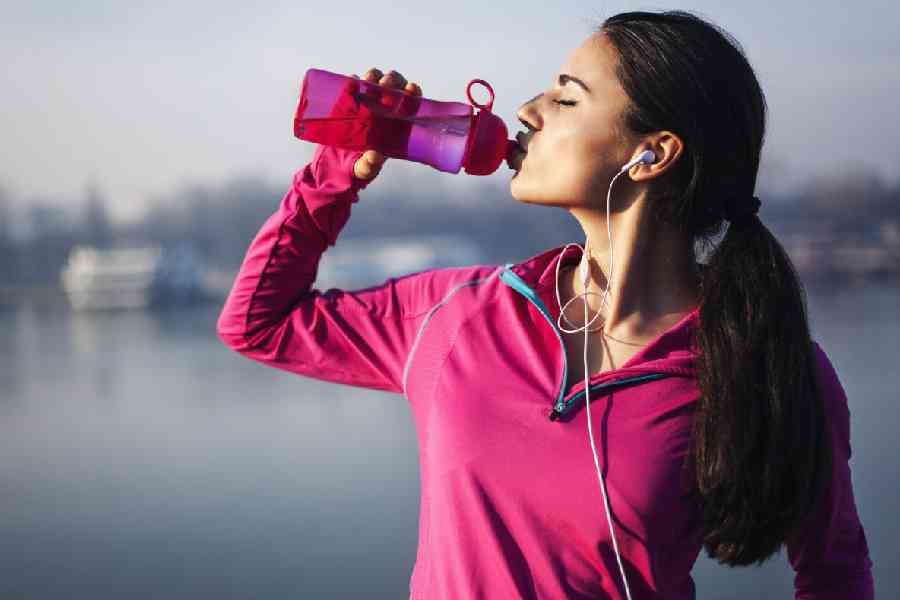How much water does the average person really need to drink? And is there such a thing as too much? If you’re not sipping from a 64-ounce (1.9 litre) Stanley cup all day, are you even alive? Hydration is once again having a moment — TikTok videos with the #watertok hashtag now have more than 1 billion views.
Whether you’re drinking from a trendy tumbler or a plain old glass, there is no “one-size-fits-all” answer to how much water you should drink in a day. The closest thing the United States has to a water consumption recommendation comes from the National Academy of Medicine, which, in 2004, reported that healthy men usually stay adequately hydrated when they drink at least three litres (nearly 13 cups) of water per day and that women are typically hydrated when they drink at least 2.2 litres (just over nine cups) per day, not including the water they consume via food.
But these guidelines should not be taken as gospel, experts said.
“Most people, even if they stay below that recommendation, will be just fine,” saidDr Siddharth P. Shah, a nephrologist at the Hospital of the University of Pennsylvania in the US who specialises in hydration and electrolyte balance.
Water is, of course, crucial for our survival. It helps us eliminate waste, maintain blood pressure, regulate body temperature and more. But when should you drink it and, more important, just how much is necessary?
Some people need more water than others. People who are especially active — who have physically demanding jobs or who exercise a lot — lose more water through sweat and will need to compensate by drinking additional water, said Dr George Chiampas, an emergency medicine specialist at Northwestern Medicine, US, and the chief medical officer for the US Soccer Federation.
People may also need to drink more if they live in hot climates, have larger bodies or lots of muscle mass, have loose stools, are pregnant or breastfeeding, or have had kidney stones or recurrent urinary tract infections, experts said.
Over the course of life, a person’s water needs change, too. Typically, with age, people lose muscle and gain fat, Dr Shah said. Because fat contains less water than muscle, people generally need to consume less water with age to maintain healthy tissues.
Yet some older adults still do not consume as much water as they need,Dr Shah said, because the bodies of older people — particularly, research suggests, those over the age of 60 years — are not as good at detecting thirst. The level of dehydration “that would make you thirsty at the age of 40 years might not make you as thirsty when you are 80 years old,” he explained.
If you do feel thirsty, you’re probably dehydrated and should drink water, saidDr Alysia Robichau, a family and sports medicine physician at Houston Methodist in the US.
There can be much more subtle signs of dehydration,too, such as feeling constantly cold or having dry skin,Dr Robichau said. People who are acutely or chronically dehydrated may also have headaches or dry eyes, she added.
Because people go without water while they sleep, “most people wake up and they’re already dehydrated,” Dr Chiampas said. It’s generally a good idea, he said, to start the day with a glass.
It’s perfectly fine to add flavourings to your water or to drink carbonated water, Dr Robichau said — but she warned that coffee and other caffeinated beverages may not be as hydrating as uncaffeinated drinks. Drinking a caffeinated beverage, especially if you don’t drink them regularly, can reduce the ability of the kidneys to absorb water, leading you to lose additional water through urine. Alcoholic beverages are dehydrating, too.
K eep in mind that you can also get water from food. Some fruits and vegetables, such as watermelon and celery, are mostly water, Dr Shah said. The National Academy of Medicine estimated that people get, on average, 20 per cent of their water through food.
Most people are unlikely to drink too much water, but it is possible, especially among endurance athletes who drink lots of water quickly, Dr Chiampas said. Doing so can disrupt the body’s balance of sodium and potassium and lead to potentially fatal water intoxication.
The US Centers for Disease Control and Prevention advises not to drink more than 48 ounce (1.24 litre) of water per hour. Keep in mind, too, that there is probably no health benefit to guzzling tons of water.
“There are a lot of excessively large water bottles being carried around by people these days,” Dr Shah said. “But the overwhelming majority of people do not need to drink an excess of water.”
NYTNS











